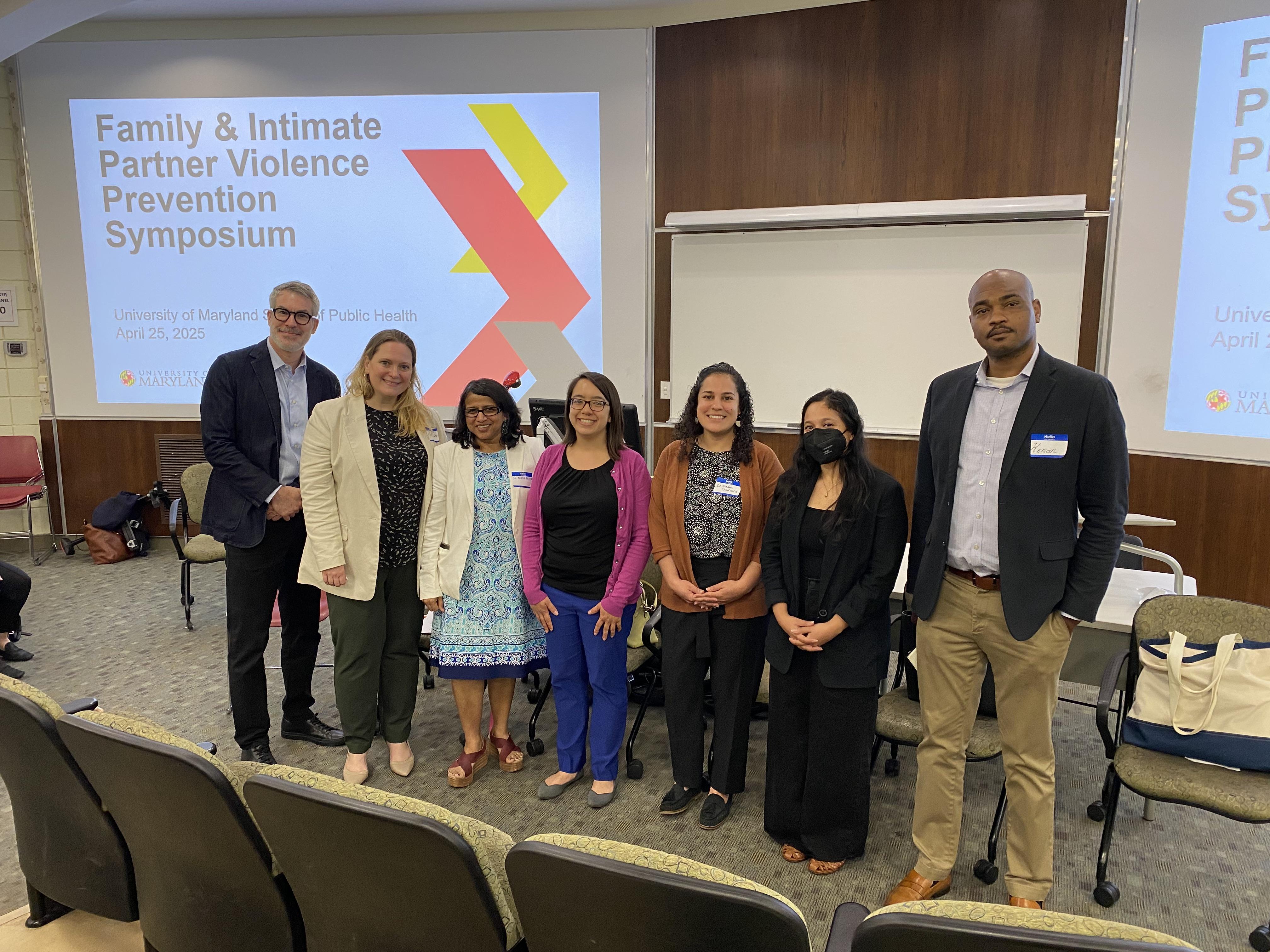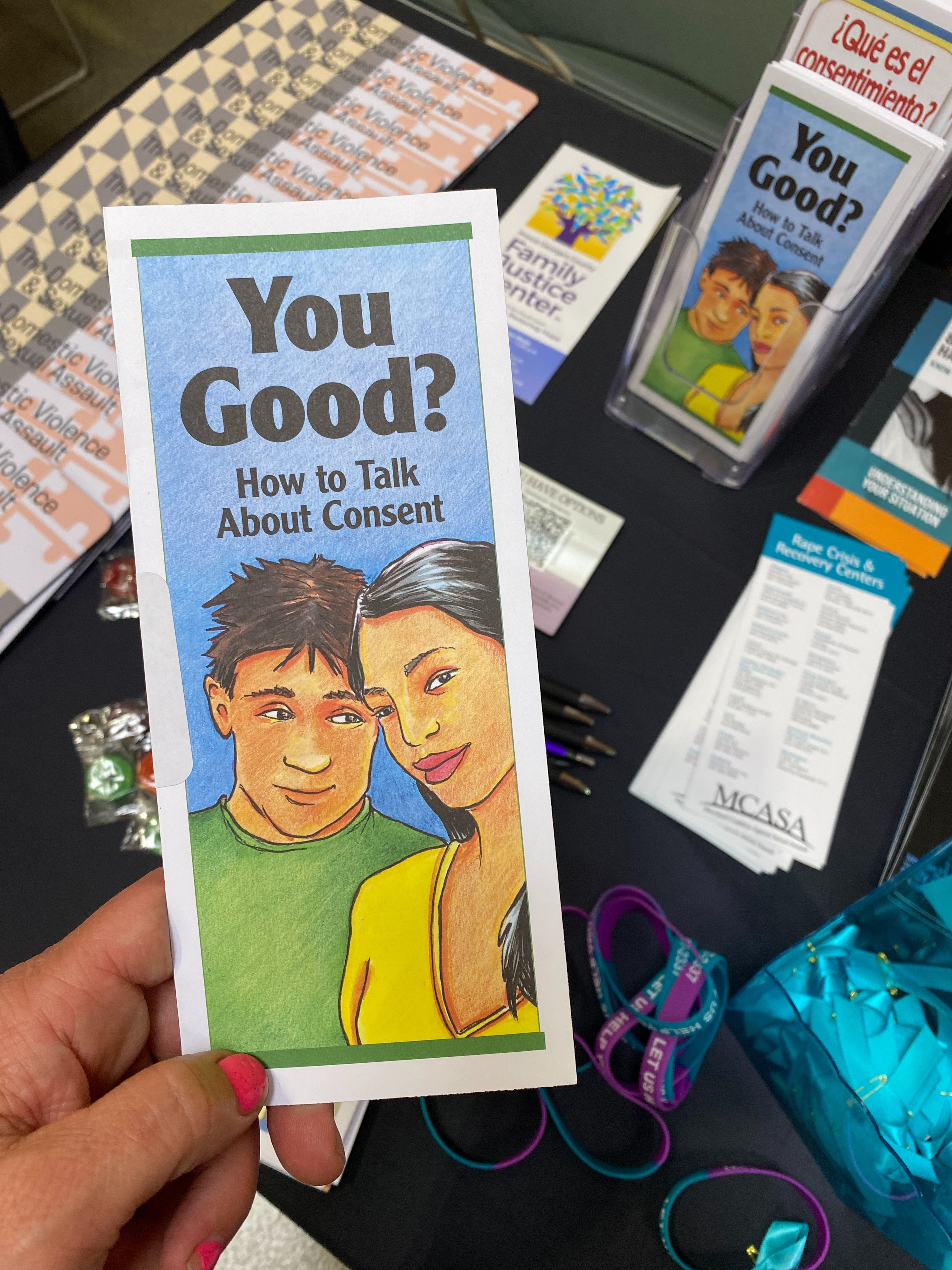
On a breezy spring morning, over a hundred people gathered at UMD School of Public Health to discuss a painful and pervasive problem: interpersonal violence.
It is an everyday occurrence in families, couples and communities across America: at least one in seven children experienced child abuse or neglect in the past year, one in four women and one in nine men are victims of domestic violence and transgender people are over four times more likely than cisgender people to experience violence.
“Violence has devastating effects on individual, family and community health and wellbeing. Survivors have elevated anxiety and depression symptoms, hypervigilance, substance use and a likelihood of either experiencing violence again later in life or perpetrating violence themselves,” said the symposium’s organizer, SPH Associate Professor Elizabeth Aparicio. Aparicio directs the Community THRIVES Lab, which conducts health research at the intersection of family violence, early childhood, and adolescent sexual health.
“There are countless groups doing important work on violence prevention. But we are separated into either child abuse or domestic violence, despite these two areas being so interrelated,” said Aparicio. “One of the main goals of our symposium is to gather expertise from across sectors and communities to collaborate on stopping violence before it happens.”
Mona Mittal is an SPH associate professor and family therapist focusing on domestic violence research in adults. She participated in the symposium’s research innovation panel, alongside experts in psychology, violence reduction and epidemiology. “I’m excited to seek ways to go forward together, to break silos and connect family violence work with interpersonal violence work,” Mittal said.
Director of UMD’s Violence Reduction Center and associate professor in criminology and criminal justice, Thomas Abt, agrees that this integration is vital to prevention. “There is a clear connection across all these issues – for example, addressing things like child neglect early can be a way to reduce interpersonal violence later.”

An afternoon panel focused on policy and practice innovation, with experts in health literacy, clinical responses and community-based interventions.
For Reesie Sims, panelist and director of therapeutic services at Volare, a crime victims rights organization meeting legal and therapeutic needs of survivors of violence in Washington, D.C., the symposium offered space to touch on essential cross-cutting topics.
“We are asking: How can we intervene in the sphere of family violence and domestic violence? How do we stop the cycles of violence?” she said. “What I found interesting was that most participants gave a similar answer – it’s about engaging community.”
SPH Assistant Professor Sarah Peitzmeier whose research focuses on sexual assault prevention in trans and nonbinary students, as well as cisgender women and sex workers, is keen to find innovative ways to disseminate research findings to the people most affected.
“I feel really energized in spaces like this symposium where researchers and practitioners are brought together. I came away with several new connections and am looking forward to continued conversations with potential new community partners about how we can enhance each other's work,” said Peitzmeier.
Swati Sah, panelist and doctoral student researching college campus sexual assault prevention, helped to organize the conference. Sah is also the coordinator for sexual assault prevention for fraternity and sorority life at UMD. Beginning her career as a domestic violence advocate, Sah said, “My research connects very much with the goals of this symposium – seeking to connect the dots between systemic violence and varying interpersonal violences to talk more broadly about oppression and tools of oppression.”
The organizers hope the symposium becomes an annual event. April is both Sexual Assault Awareness Month and Child Abuse Prevention Month. At UMD’s School of Public Health, the month is now also a critical time for an annual gathering of experts dedicated to finding public health solutions to interpersonal and family violence.
Find out more about public health solutions to violence – Centers for Disease Control and Prevention (CDC)
RAINN (Rape, Abuse & Incest National Network) – the nation's largest anti-sexual violence organization, RAINN operates the National Sexual Assault Hotline, 800.656.HOPE, online.rainn.org y rainn.org/es
CARE – Campus Advocates Respond and Educate to Stop Violence offers free therapy and advocacy resources
Maryland Child Protective Services – how to report suspected child abuse or neglect
***
This event was supported by: Center for Healthy Families at UMD; Maryland CASA; UMB Center for Violence Prevention; UMD Department of Behavioral and Community Health; UMD Department of Behavioral and Community Health Community Engagement Committee; UMD Department of Family Science Couple and Family Therapy Program; UMD School of Public Health Office of Public Health Practice and Community Engagement; UMD School of Public Health Prevention Research Center; UMD School of Social Work; UMD Violence Reduction Center.